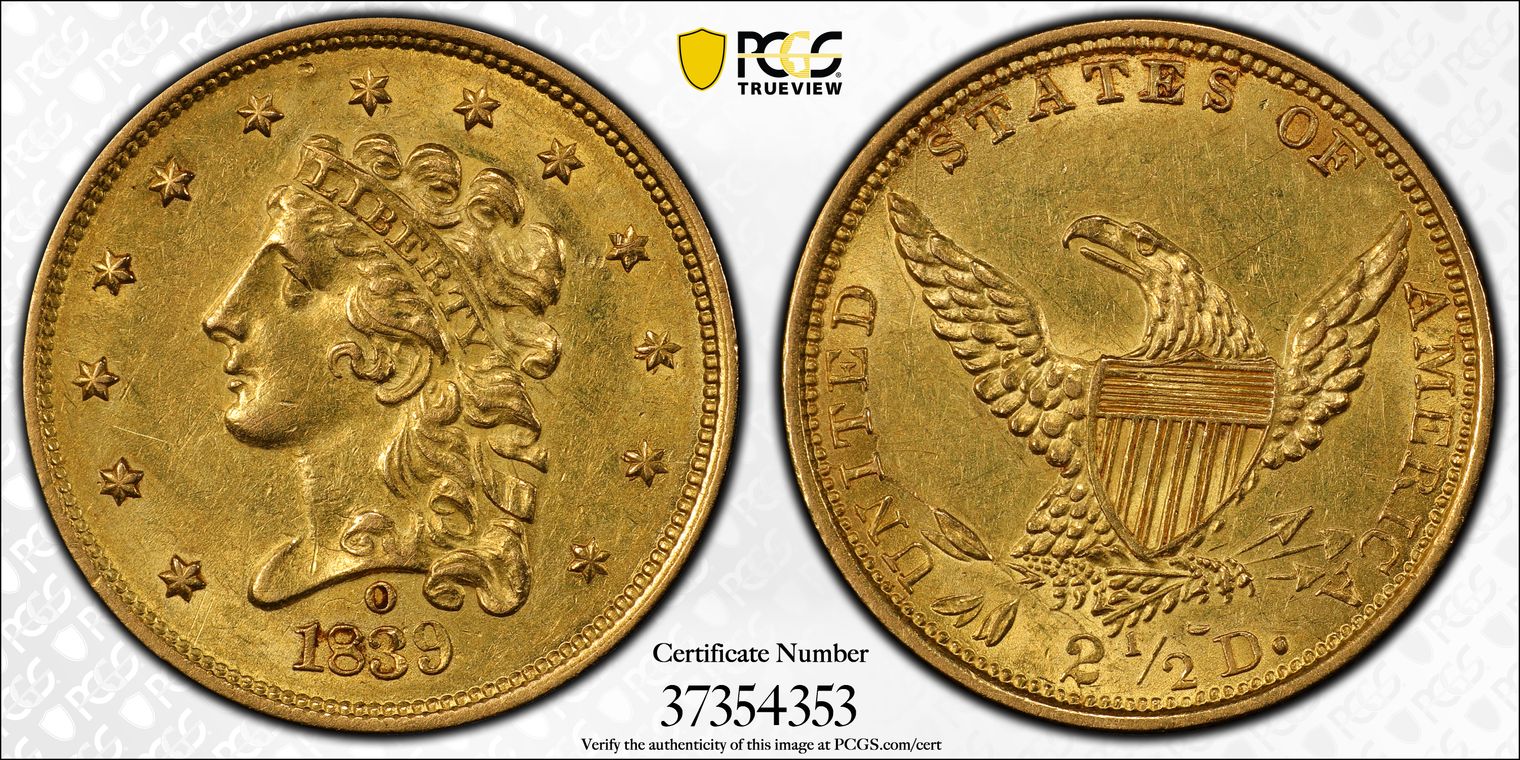1839-O $2.50 AU58 认证号37354353, PCGS号7701
专家评论
David Akers (1975/88)
Despite the fact that the mintage of the 1839-O is comparable to the 1839-C and significantly less than the mintage of the 1839, the auction records correctly indicate that it is much more common in all grades than either of those two. Some of the known specimens have a 180 degree rotated reverse, but such specimens do not seem to command any premium. I have seen a number of choice uncirculated pieces, the finest being the Unc-65+ gem owned by Max Humbert.Doug Winter
The 1839-O quarter eagle is a historically and numismatically significant issue. It was the very first gold coin produced at the New Orleans mint. It is the only Classic Head issue of any denomination from this mint and the only New Orleans quarter eagle with the mintmark located on the obverse. The 1839-O quarter eagle appears to have been saved in greater quantity than older New Orleans issues of this era and it is less rare in high grades than most of the quarter eagles from the 1840s. Despite this fact it is extremely popular.The 1839-O quarter eagle is a popular one-year type coin featuring the distinctive Classic Head design on the obverse. It is common in all grades up to and including AU55. It becomes scarce in accurately graded AU58 and it is scarce in the lower Uncirculated grades. It becomes quite rare in MS63 although there are probably more examples known in this grade than any other quarter eagle from this mint. In MS64 and above, the 1839-O is very rare.
STRIKE: Most show weakness at the centers. On the High Date variety (see below) die polishing makes the hair curls appear fragmented, giving the false impression of wear even on high grade specimens. The stars are often flat at the centers and the obverse denticles may show flatness. The reverse is generally better struck, although the 5:00 to 7:00 region is often lightly impressed. As a rule, the Low Date variety is seen with better detail than the High Date variety.
SURFACES: Even high grade 1839-O quarter eagles are apt to show numerous scuffmarks, abrasions or scratches. Circulated examples often have detracting deep marks in the fields. I have seen a number with copper spots or areas of blackish mint-made discoloration.
LUSTER: The luster is typically frosty or satiny in texture. Some of the high grade pieces that have been offered in recent years have wonderful thick, frosty luster that far exceeds the quality seen on later issue New Orleans quarter eagles. On lower grade pieces the luster is more likely to be impaired as the result of cleaning or dipping.
COLORATION: Examples with original coloration show attractive medium to deep yellow-gold or medium green-gold hues. Reddish accents are sometimes seen at the borders. There are a few extremely nice high grade pieces known with good color but most are off the market in tightly-held collections. However, washed-out overdipped specimens are becoming the norm.
EYE APPEAL: This date shows a wide variety of “looks.” If a collector has a large budget and is patient, he should be able to locate a very attractive high grade example with good luster and color. Collectors with a more limited budget are likely to be offered a dipped piece with below average eye appeal. It is hard to find nice, original Extremely Fine and About Uncirculated 1839-O quarter eagles.
DIE CHARACTERISTICS: The fourth star is double cut at its northeast point. The two major varieties have other die characteristics that are listed below.
MAJOR VARIETIES: There are two very distinct die varieties known. Many collectors of New Orleans quarter eagles seek to obtain both, as they are very distinctive.
Variety One: High Date with Wide Fraction. On the obverse the date is placed high in the field with the 9 close to Liberty’s curl and higher than the 3. On the reverse there is no berry and the arrow shafts are disconnected. The fraction is widely spaced while the arrowheads are well formed.
This is the more common of the two varieties.
Variety Two: Low Date with Close Fraction. On the obverse the date is placed lower in the field with the 9 away from Liberty’s curl and even with the 3 at the top. Early die states show slight doubling inside the upper curves of the 3 and the 9. On the reverse the berry is present but it is disconnected from the stem. The fraction is very close and the arrowheads are malformed.
Late die state coins show severe cracks with an eventual shattering noted on the reverse. The reverse is often in a medallic alignment with 180 degree rotation from the obverse.
This is the scarcer of the two varieties and it appears to be quite rare in high grades.
PCGS #
7701
设计师
William Kneass
边缘
Reeded
直径
18.20 毫米
重量
4.18 克
铸币数量
17781
金属成分
90% Gold, 10% Copper
更高评级数量
28
评级较低的钱币数量
258
地区
The United States of America
价格指南
PCGS 数量报告
拍卖 - PCGS 评级的
拍卖 - NGC 评级的
稀有性和存量估计 了解更多
| 所有评级 | 400 |
| 60或以上 | 24 |
| 65或以上 | 0 |
| 所有评级 | R-6.2 |
| 60或以上 | R-9.0 |
| 65或以上 | R-10.1 |
| 所有评级 | 6 / 11 TIE |
| 60或以上 | 5 / 11 |
| 65或以上 | 1 / 11 |
| 所有评级 | 6 / 11 TIE |
| 60或以上 | 5 / 11 |
| 65或以上 | 1 / 11 |






















